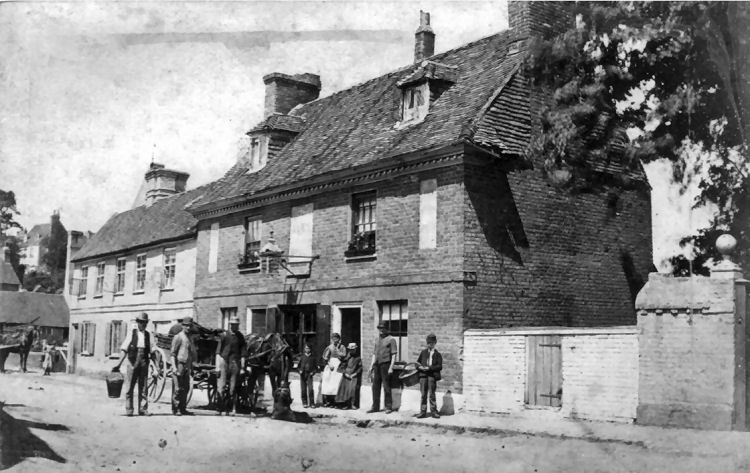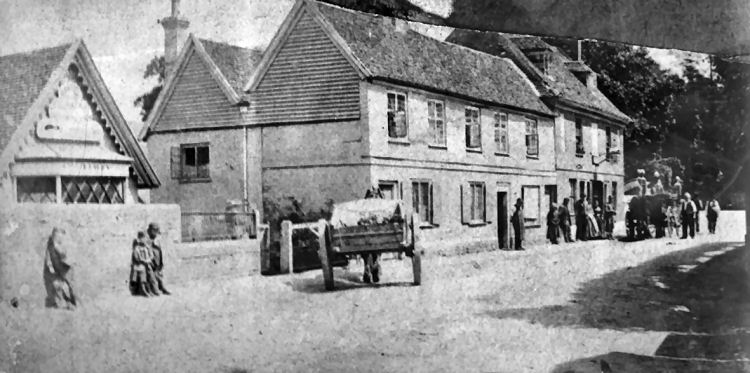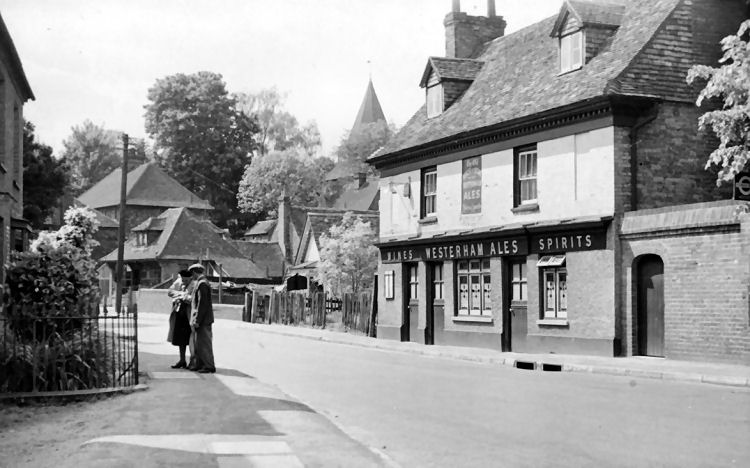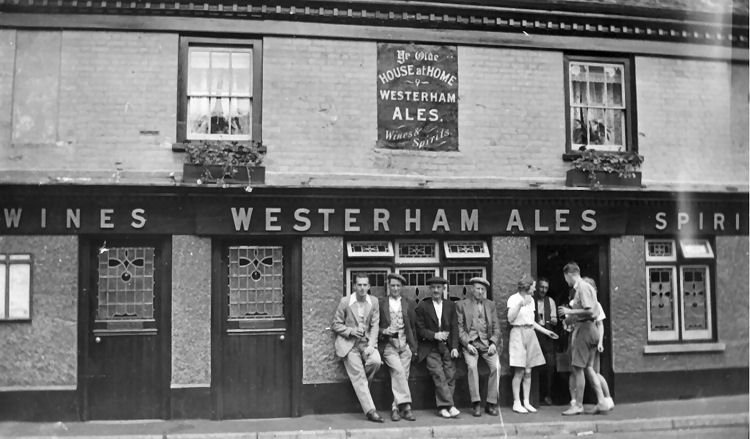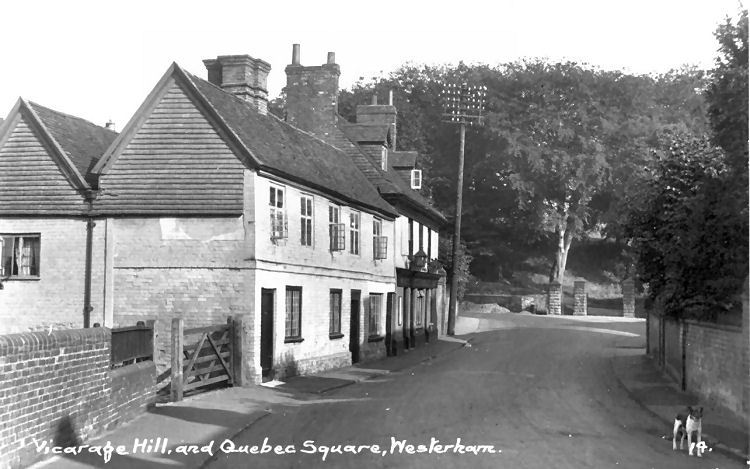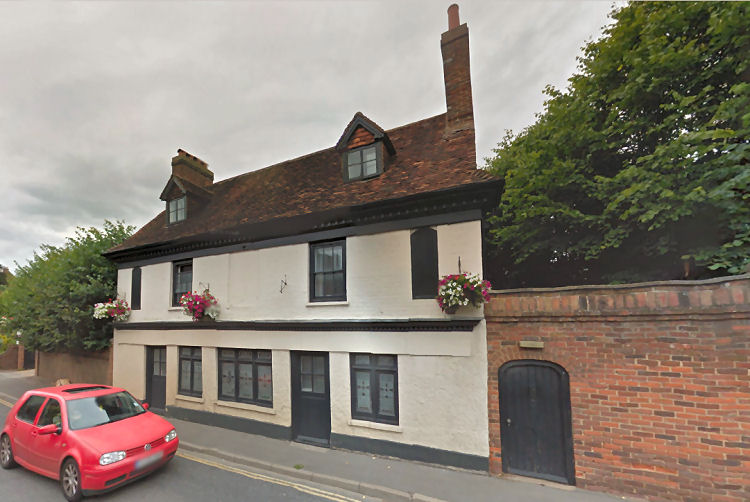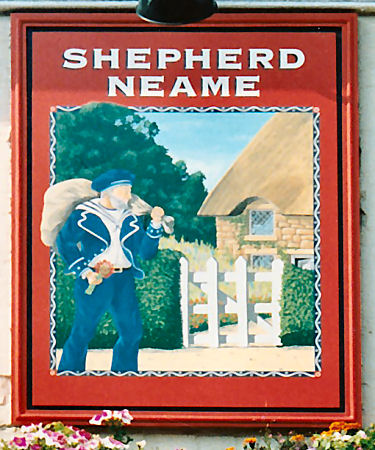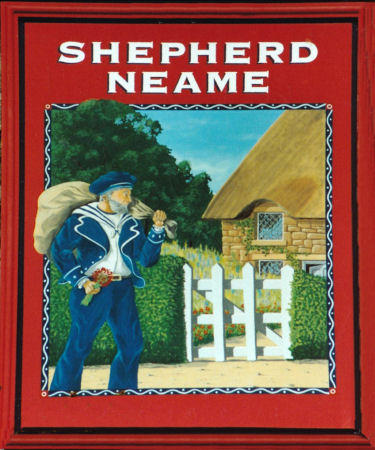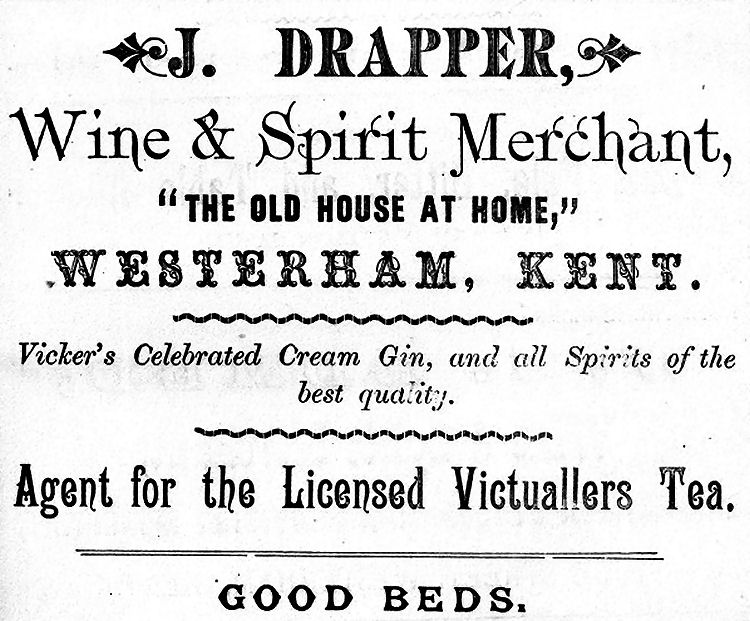|
Sevenoaks Chronicle and Kentish Advertiser, Friday 21 March 1913.
The old House at Home.
Evidence was first called with respect to the "Old House at Home," Mr.
C. E. Warner "Solicitor, Tonbridge) appeared for the brewers Messrs.
Bushell, Watkins and Smith.
Superintendent Fowle pointed out that at Westerham there was an acreage
of 5,804, and a population according to the last census, of 3,049. They
were eight licensed houses and one beerhouse, which came to an acreage
of 336 to each licence house. Since 1904 there been no change in this
licensed house.
In reply to the Chairman Superintendent Fowle said that the acreage and
population did not include Brasted and Sundridge.
The Clerk mentioned that included Crockham Hill, which did not possess a
large population.
The Rev. Acworth said that he understood that the actual population in
Westerham was under 2,500.
The Chairman (to the Superintendent) what do you think is the number of
houses needed for this place?
I think one can be done away with.
The Chairman:- Do you think that they will be ample accommodation
without one?
Quite, sir.
An ordnance map was produced and handed to the Bench, and showed the
position of the house in question. Cross examined by Mr. Warner,
Superintendent Fowle said there had not been a transfer since 1904. He
did not know anything about the trade of the house and could not make a
statement that it was a house of frequent call.
The Chairman:- Can you say that it is a good house for supervision?
Yes, sir.
The Chairman:- Have you any objection to make?
None at all.
Mr. Warner explain that the actual transfer took place in October, 1902,
those were his instructions.
Mr. Warner (to the Superintendent):- This house from the inside
structure arrangements is a good one?
Yes, sir.
Continuing, Superintendent Fowle said it was on the main road leading
through Westerham and the various villages on the outside, and that
probably it would be a house of call for people with vehicles.
Sergeant C. Huggett, station at Brasted, gave evidence that the position
of the house was near the crossroads and the end of Westerham.
The Rev. Acworth. It is actually at this point.
Cross examined by Mr. Warner, Sergeant Huggett said that the nearest
house to the one in question in the village would be about 320 yards
distant. He would agree that this house would take the trade with
vehicles and people coming from certain villages outside. They had been
in the neighbourhood some six or seven years and known the house well. It
was structurally alright and suitable for police supervision, and it was
well conducted. He had noticed one of two vehicles standing there
occasionally, the occupants of which stopped for refreshment. There was
a motor works about 50 or 60 yards away, and there was some building
about to be carried out in the vicinity of Hosey Common. Hosey common
was about three quarters of a mile distant. He had no complaint to make
about the house.
The Chairman:- I want to know if you think Westerham is well supplied or
not?
It is well supplied.
You think it would be better still better if it had not got so many
houses?
Yes, sir.
The Rev. Ackworth:- Do you think it is useful to passers-by or to people
on the spot?
To people on the spot.
Here Mr. Warner handed to the Bench a statement showing the amount of
trade during seven years and the last three years.
The Chairman:- It is a very steady trade.
Mr. Newton, the manager and secretary at the brewery, was called and
said that he had taken the figures given from the books.
The Chairman:- How many houses have you in Westerham?
Five.
Mr. Warner said it was interesting to look at the figures, because they
could see how the trade of a public house could change.
The Chairman:- Much more bottle and less draught?
Yes, sir.
The Chairman:- And the crates have increased enormously, what does this
mean?
Mr. Newton explained that there were four quart bottles in a crate.
The Chairman:- What class of customer is it who takes the crates?
Private householders as a rule.
The Chairman:- As opposed to people who drink at the bar?
There is a certain amount of bottle beer drank in the house, but very
little, I think.
The Chairman:- You say there are five houses in Westerham and not
outside?
Mr. Newton I think that I should be right in saying we are the mainstay
of Westerham, and employ 60 or 70 men, paying out over £100 a week.
Chairman:-. I do not know if it is fair to ask you if this is a house
which you can willingly spare?
No, sir.
Mr. Warner:- You are an old inhabitant of Westerham, what is your
opinion about the number of houses. Do you think they are over done?
I do not know. There are not too many belonging to my company at any
rates.
The Chairman:- You would not say that the accommodation is not ample?
No, sir, but you must take into consideration that it is our home when
we say that we have five houses there.
Mr. Charles Bassett, the tenant, said he had been there since October,
1902. When he went in, he paid £650 for evaluation and £104 9s. 6d., for
stock and that was his own money.
The Chairman:- Do you say that you actually invested that sum in the
house?
Yes, sir.
Captain Pym:- I understand that when a new tenant goes in, he generally
pays the same as the outgoing tenant.
Mr. Warner:- The question of evaluation is always uncertain. The
question of Goodwill sometimes comes in.
The Chairman:- It is a good bit above the average.
Mr. Warner:- It is a good house.
Continuing, witness said that his payments per annum for cigars and
tobacco came to £110 6s. 2d. This was an average for three years. His
takings on an average for three years was £1,403, which came to £20 or
£30 a week. He did a big jug trade, between 30 and 40 customers coming
in each day.
The Chairman:- Do you mean the same people or different people every
day?
Different people.
Continuing, he said that he supplied luncheons and had regular customers
who came in there on certain days. The house was on the main road from
Westerham station, and carter's and others came from the goods yard to
his house and had no other place that which to call direct. At Hosey
there was some stone quarries and Carter's came in his direction and
sometimes stopped at the house. There are also between 70 and 80
dwelling houses within a radius of 200 yards of his house. There were
two large works near to his house, wear 20 or 30 men were employed most
of them were his customers. About 40 vehicle stopped at his house on the
average per day. There was also a large building to be erected at Hosey
by Mr. Darken. If his house was closed these men employed would have to
go further up the street. He has got a petition (produced) signed by
influential people - gentleman as well as working men. He also possessed
a slate club at the house with 69 members, and he frequently supplied
teas. There was a motor workshop near his house, owned by Mr. Evenden,
and all the men came into his house for lunch.
Mr Warner:- And supposing the house closes, you lose your competition?
I do not know.
Mr. Warner:- You have not had any experience of that yet.
Mr. Norman Darken was called, and said that he had a preparatory school
opposite to the house. He had been there four years and knew the conduct
of the house, and thought it was necessary for the requirements of the
neighbourhood and fulfilled a proper position in the licensing world. The
conduct of the house was good.
The Chairman:- It is not a house where you see people finding a
difficulty in getting home?
I have never seen anything like that at all.
Mr. Evenden from the motor works, said he thought the house was very
necessary. His men used the house. He had lived near the house for about
2 years, but had been going to his works for about a quarter of a
century.
The Bench adjourned to deliberate for some time, and upon returning to
Chairman said that they had settled to refer the "Grasshopper" and renew
the "Old House at Home" and the "Royal Standard."
|
